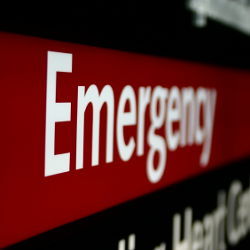
Veroniche
Western Region, US
Female, 54
I’ve been an ER nurse manager since 2009. Previously, I spent 24 yrs as an ER nurse. My hospital, a Level III trauma center, sees 70,000+ ER patients/yr. My responsibilities include billing, federal/state regulation oversight, metrics reporting, software education of e-records, and hiring/termination/disciplinary actions. The ER is one of the key impacted areas of healthcare reform. It’s a scary and exciting time for us, not just in the care of patients, but what the future holds for healthcare.
It depends. Our hospital CEO has been a patient in the ER a couple of times, and initially no one knew who he was and he just went through the system like anyone else. He thought the care was outstanding, and he was treated appropriately. Thank goodness. We have also had a "secret shopper" program to see how patients are treated, we are not doing that any more. The only thing the 'secret shoppers" do anymore is monitor staff handwashing. Several years ago, a patient who had Secret Service protection ( that is all I am going to say) needed to come to the ER. The Secret Service called ahead of time, and we arranged a "back door" entry, and expedited this person's treatment. It was so well managed, that even many of the staff had no idea what was going on. At a previous hospital we treated the mother of a prominent state official, and we expedited her care, and made sure everything was really private, but she was not seen before anyone who was sicker. I always want to have my family or myself treated in the ER that I work in because I know how good of care we give. When I know we have to come to the ER, I usually call ahead to see which doctors and nurses are on, and generally we have that "perk" of asking a specific person to take care of you. Of all of the times me or my family members have been in the ER, however, we have never bumped anyone that was sicker. This is a little off the subject, but one of my jobs is to make sure that no staff look at medical reccords of "famous" people, or unusual patients or accidents, unless they are directly involved in the care of the patient. Since our medical record is electronic and protected, you can easily see when someone is poking around that shouldn't be--it shows when you logged in and from what IP address. That can get you fired in a heartbeat.
They are dirty because they need to be cleaned more! We have three bathrooms for 58 patients, and two public restrooms. They are cleaned once a shift (three times a day), and more if we call them, but it is hard to keep up with them. When the budget trimmers come around, housekeeping is looked at as a non-patient care item, so sometimes the axe falls with those type of departments first. However, a lot of the hospital complaints have to do with cleanliness and I would agree that we don't give that as high of a priority as we should. You can tell a lot about a place by how clean it is/or not. And that is not even taking into account all of the infectious diseases and just plain yuck that you may see. Kind of like a subway platform. Now I digress a little--but follow me here. Any hospital is highly regulated--thousands of pages of rules and regulations that we have to follow to keep our federal funding. The cleaning of blood has different rules, bodily fluids are different, chemicals used to clean are very specific. We can't just wipe off a toilet with a wet wipe like you do at home and call it good. The hospital has a whole department devoted just to making sure that we all follow the rules. The rules and regs are there to protect the patient, and sometimes we spend more time trying to keep the rules than taking care of the patient and keeping them happy and safe.
Our ER has 53 beds, not including the gurneys we put in the halls for the overflows. We are full by 11 AM and stay that way until about 2 AM, then slowly empty out and start all over again. Each nurse cares for about four patients at a time, fewer if the patients are really sick, and more if the illness is minor. We have a good sense of busiest days and times of days. All of the staff, including hospital administration, is very aware of our wait times because it is a marketing and advertising draw. ERs in this area are very competitive and want to make the ER visit for the patient as painless as possible. 85% of our patients are seen by a doctor in 30 minutes or less. If we have an open bed, we take the patient right back into the room, rather than sign them in and tell them to "take a seat" -- this measure has shortened our wait to see a doctor significantly. We have built-in triggers in our computer system that warn us when the waits are getting long, there are too many people lining up out the door (that really happens, it is not a figure of speech!)
ER nurses are a special breed! Type A, mavericks, strong personalities who won't take a lot of crap from other nurses. Most of us love the fast-paced environment of the ER--the constantly changing patients, the interesting and strange things that we see on a daily basis. There is a "detective" element to this nurse--what is wrong with this patient? It is a challenge to take a patient who may only say "I don't feel good" and figure out what is wrong and help make them better. Many love the "blood and guts" and we have been called adrenalin junkies. We work very independently, and need to make quick decisions that may have life or death consequences for the patient. Great multi-taskers, we have eyes in the back of our heads, just like mom. The ER is open 24/7, holidays included, so if you want banker's hours, this job is not for you. Most shifts are 12 hours, which can be a killer as you get older (I’m 54). The ER nurses generally are younger and very physically active. The clinic/office nurses are drawn to the more long term nurse/patient relationships and working with the patients in lifestyle changes, education and management of their health problems. The hours are more "regular," and the job is not as physically demanding.
The IT Guy
 What's the the stupidest IT question you've every gotten?
What's the the stupidest IT question you've every gotten?
Emergency Room Manager
 What is the most bizarre thing you've seen in your ER?
What is the most bizarre thing you've seen in your ER?
Geek Squad Agent/Supervisor
 What's the biggest scene a customer's ever made in the store?
What's the biggest scene a customer's ever made in the store?
You got a morphine drip for a tonsil infection? Sweet!!! Seriously—the premise of all emergency visits from the perspective of the physician is that we look for the things that are going to kill you first, and then work down from there. A severe tonsillitis can cause obstruction in a person’s breathing, or cause an abscess in the tonsil that is a surgical emergency. A level 5 charge sounds totally appropriate (without reviewing your medical record, of course). How the ER charges for the care is determined by the federal government. There are 5 levels, 1 being the least (like stitches being removed), up to a level 5, which are sick people, some who don’t have to be admitted, but come in with a potentially life threatening problem, which yours could have been. How much the hospital charges for each level is up to the hospital. In our area, the ER level charges are pretty much the same no matter what hospital you go to. As I mentioned in a couple of previous posts, emergency care is very expensive—one due to it being mandated by the government without funding assistance; everyone pays more to balance out for the people who can’t pay. Just like auto insurance is high for everyone because of those folks who drive without insurance and then get into an accident…. If you have insurance, the insurance company usually contracts to pay a certain percentage of what the actual bill is. It is unlikely that the your insurance paid the hospital $9000. Probably more like $3500. If you don’t have insurance, most hospitals will negotiate a lower price similar to what the insurance company is paid, and work with a payment plan. I’m glad you are ok, because I have seen patients die with what you had.
The creepiest thing I have seen, I wouldn't call it bizarre, but I will never forget it--a patient came in with his arm amputated just above the wrist in a farming accident. When there is a chance to put the part back on, there is always a staff member whose responsibility is to take care of the amputated part. In this case, it was me. I opened the cooler (the patient had been flown in from a rural area), and the arm was just lying there in a plastic bag in a container on ice. It reminded me of "Thing" from the Addams Family. I almost expected the hand to climb out of the cooler by itself. By the way, the surgeons were able to reattach the hand and with a lot of physical therapy, it ended up being a pretty functional hand. Anything you can imagine has been put in a bodily orifice. From the common Lego up the nose, bean in the ear, lost tampon (how do you forget about a tampon?), and you can let your imagination run wild, it has probably happened. There are stories all over ERs about this, but this one was one of my patients--a young man inserted a thin glass chemistry tube about the size of your pinky into his urethra. He had to go to the OR to get that removed. This was not in an orifice, but here is the scenario--I was there. A gentleman had placed a common hex bolt around a certain body part and low and behold it became stuck. It became a medical emergency because the blood flow to the body part was being stopped and it was becoming blue, no blood flow. We had to get a pair of bolt cutters from the hospital engineers, and the physician who happened to be 9 months pregnant, was leaning over the gurney trying to get enough strength to cut that 3/4 inch bolt off before he lost his member. She's nearly in labor, he is screaming and thankfully it worked. After about an hour, he regained blood flow and his pain went away. He said "thanks" and walked out the door. Whatever.... I'm sure there are better stories out there, but I only want to refer to what I've seen or done myself.
I’m afraid I don’t have a wonderfully inspiring story of how I got into the nursing field. I would love to be able to say that the life of Florence Nightingale drew me into nursing, but it was a lot simpler than that. I was originally a music/piano major, and came to the realization that I did not want to practice the piano the rest of my life. At that point I had no idea what I wanted to be when I grew up, but needed a direction. Many of my friends on my dorm room floor were nursing students and I thought “I could do that,” and that’s how it started! Once I got into the classes and clinicals, I loved it!
-OR-
 Login with Facebook
Login with Facebook (max 20 characters - letters, numbers, and underscores only. Note that your username is private, and you have the option to choose an alias when asking questions or hosting a Q&A.)
(A valid e-mail address is required. Your e-mail will not be shared with anyone.)
(min 5 characters)
By checking this box, you acknowledge that you have read and agree to Jobstr.com’s Terms and Privacy Policy.
-OR-
 Register with Facebook
Register with Facebook(Don't worry: you'll be able to choose an alias when asking questions or hosting a Q&A.)